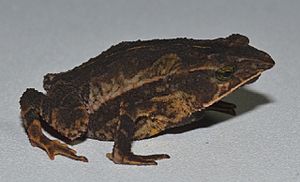Rhinella macrorhina facts for kids
Quick facts for kids Rhinella macrorhina |
|
|---|---|
 |
|
| Conservation status | |
| Scientific classification | |
| Synonyms | |
|
The Rhinella macrorhina is a special kind of toad that lives only in Colombia, a country in South America. It belongs to a family of toads called Bufonidae. This toad is known for living in very specific places.
It makes its home in wet, tropical montane forests. These are forests found on the sides of mountains. Sadly, this toad is currently facing a big problem: its natural home is shrinking. This is called habitat loss, and it means the toad's living areas are disappearing.
Contents
What is Rhinella macrorhina?
The Rhinella macrorhina is a type of toad. Toads are amphibians, which means they can live both on land and in water. They are known for their bumpy skin and short legs, which are good for walking or hopping. This specific toad was first described by scientists in 1971.
Where Does It Live?
This unique toad is endemic to Colombia. This means you won't find it naturally anywhere else in the world. It prefers to live in high-altitude areas, specifically in moist forests on mountains. These places usually have a lot of rain and thick plant life, which is perfect for amphibians.
Its Mountain Home
The natural habitat of the Rhinella macrorhina is described as subtropical or tropical moist montane forests. Imagine a forest that is always a bit damp and cool, even though it's in a warm region. These forests are often covered in mist or clouds, which helps keep the air humid. This humidity is very important for toads, as they need moist skin to breathe and stay healthy.
Why is Rhinella macrorhina in Danger?
The biggest threat to the Rhinella macrorhina is habitat loss. This happens when the places where animals live are destroyed or changed. For this toad, its mountain forest homes are being cut down or used for other things.
How Habitat Loss Happens
Habitat loss can happen for many reasons. Sometimes, forests are cleared for farming or for building new towns. Other times, logging (cutting down trees for wood) can destroy large parts of the forest. When the forest disappears, the toad loses its shelter, its food sources, and places to lay its eggs. This makes it very hard for the toad to survive and reproduce.
Protecting Its Home
Because of these threats, the Rhinella macrorhina is considered a vulnerable species. This means that without help, its numbers could continue to drop. Protecting its forest habitat is very important to make sure this special Colombian toad can continue to thrive for many years to come.
See also
 In Spanish: Rhinella macrorhina para niños
In Spanish: Rhinella macrorhina para niños


